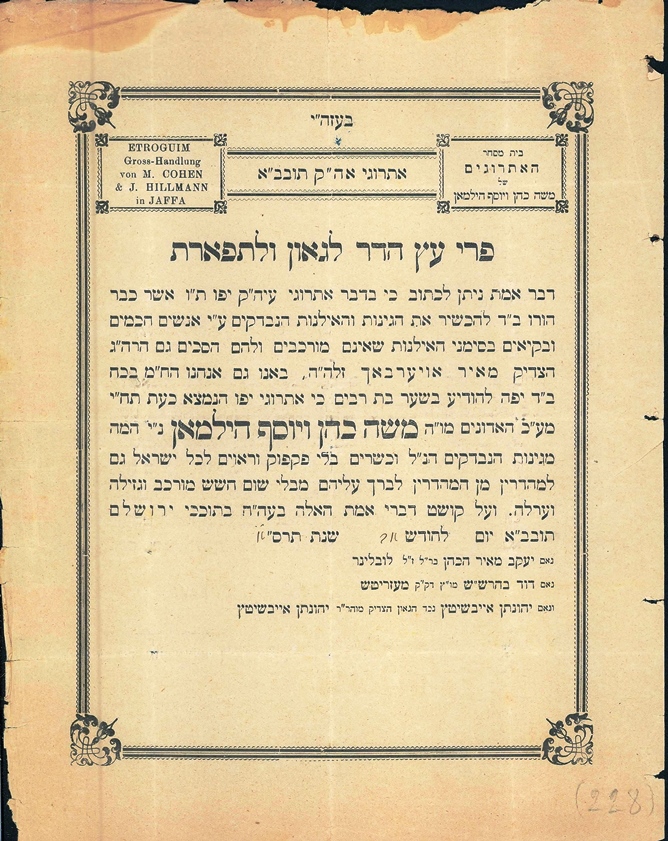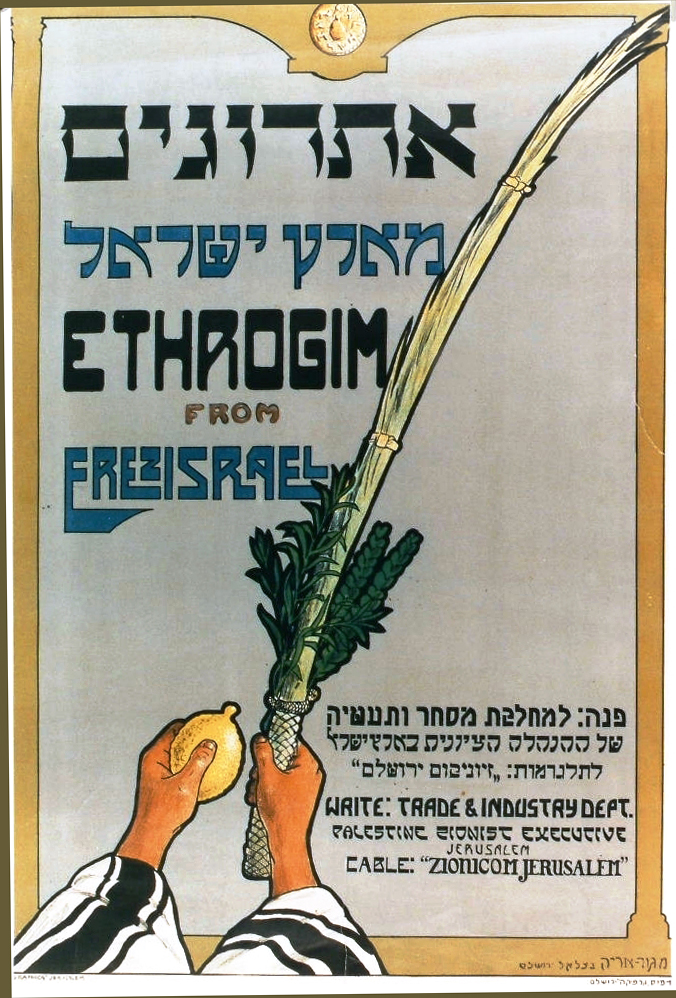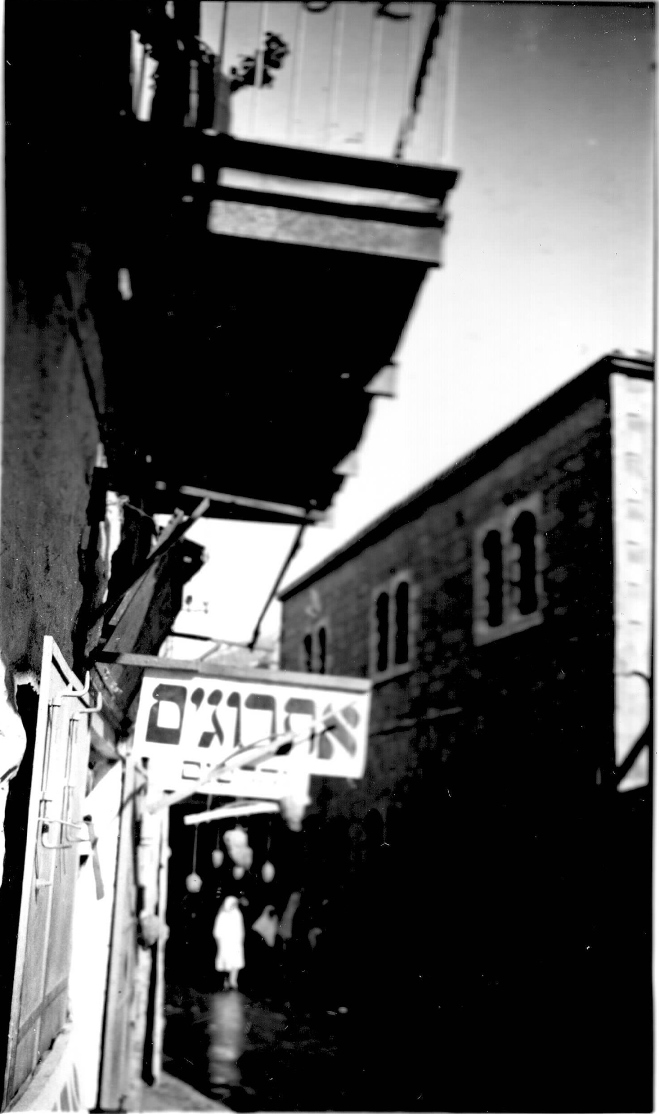The State of Israel is a main exporter of citrons (etrogim) today. The citrons that grow here are of the highest quality and are sold in large quantities in Israel and abroad. It is amazing to think that until a few hundred years ago, only a few Jews succeeded to lay their hands on a citron from Palestine. Various documents relating to the cultivating of citrons, that are preserved at the CZA, reveal the fascinating story of the citron industry in Palestine and it's close connection to the development of the Yishuv.
Mediterranean Climate
Jews of the Diaspora used to buy citrons grown in Mediterranean countries like Italy, Greece and Morocco. The most famous ones were the citrons from the Greek city, Corfu, which were known for their beauty. The Jews in Palestine turned to their Arab neighbors to buy citrons for Sukkot, mainly from villages in the north and Jericho. The Arab peasants at that time were growing trees according to traditional methods, so there was no fear that the citrons in their orchards were composed of two species of trees to strengthen the citron tree, which would have invalidated its fruit. Their citrons were not very pretty but were kosher.
Citrons orchards of Pri Etz Hadar association, Palestine. Photograph: Zadok Bassan (GNZB\401799)
From the mid-19th century, there was a dramatic improvement in transportation between Palestine and the other continents, and the export of citrons became possible. The demand for citrons from the Holy Land became greater, and at the same time there was a growing concern that the Arabs would learn how to graft the trees. All these reasons led the Jewish farmers to engage in the citron business themselves, and the first orchards were planted in Jaffa and in the early moshavot.

Kashrut certificare for citrons from Moshe Cohen & Joseph Hillman Trading House in Jaffa, 1901 (A25\113)
Citrons and Zionism
The farmers in Palestine encountered many difficulties in competing with the citron industry abroad. They lacked the knowledge and experience in treating the citron tree - as opposed to the farmers in Italy and Greece who had hundreds of years of experience. The citrons that grew in Palestine were lean and did not look as beautiful as the citrons from abroad. The long journey from Palestine to the markets around the world also affected the merchandise. At this point, an advantage in favor of the Palestinian citrons came in the form of Hovevei Zion. They turned the natural tendency to buy citrons that grew in the Land of Israel to the most important reason for its purchase. Even if the Palestinian citrons looked less beautiful, it was regarded as preferable to observe the Sukkot mitzvah of the four species by using them, rather than citrons from overseas.
When he was 70 years old, Rabbi Samuel Mohilever, one of the leaders of the Hibbat Zion movement, refused to receive gifts or telegrams of congratulations for his birthday and asked instead to donate the money to the benefit of the Yishuv. It was suggested to him that these donations would be dedicated to planting citrons in Palestine. The Rabbi adopted the idea and sent a letter to members of Hibat Zion in 1894, asking them to donate money for the citron garden. A citron orchard was planted in Hadera and was given the name Gan Shmuel. The rabbi of Jaffa, Naftali Hertz Halevy, granted the kosher certificate for the citrons of Gan Shmuel in 1901. He wrote: "And you shall take for yourselves - of your own – the fruit of the citrus planted by Israel."
Right: A letter from Rabbi Samuel Mohilever to the members of Hibat Zion, 1984 (A24\616)
Left: Kashrut certificare granted by Naftali Hertz Halevy for the citrons of Gan Shmuel (A25\112)
Another important reinforcement to the cultivation of citrons in Palestine, came in from Rabbi Kook, who immigrated to Palestine in 1904 and began serving as a rabbi in Jaffa. Rabbi Abraham Isaac Kook saw great importance in spreading the citrons of the Holy Land throughout the world and helped establish a joint association for the owners of the citron orchards, named Pri Etz Hadar. The members of the association obeyed the instructions of Rabbi Kook on how to raise the trees, especially the instruction not to graft the citron tree with other trees, and thus the prestige of the Palestinian citrons rose.


Right: Poster advertising citrons from Palestine, 1920's. Designed by Meir Gur Aryeh (KRA\219)
Left: A store selling citrons in Mea Shearim, Jerusalem, 1930's, Keren Hayesod collection (PHKH\1301970)